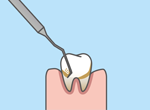Oral hygiene & fresh breath
Prevention, prevention, prevention: We believe strongly in helping you reduce the need for dental treatments through good oral care and hygiene.


We believe prevention is the key to a lifetime of dental health. See 'Our ethos'
Unhealthy teeth and gums don’t just affect your oral health, they can also damage your overall health - another reason why why we are passionate about prevention.
We offer several oral care and instruction sessions with our dental hygienist to help you keep your mouth, teeth and gums in tip to top shape:
- Scale and polish – recommended every six months to help remove plaque/tartar from your teeth above and below the gum line
- Deep clean – recommended for patients with loose or bleeding gums (gingivitis) where pockets of bacteria have started to collect. In cases of periodontic disease, we may recommend advanced periodontal care.
Sore, swollen and bleeding gums are warning signs that your gums are infected with bacteria.
If you fail to act, the infection will gradually spread. This could damage the sockets of your teeth as well as your jawbone and your teeth could become so loose that they need extracting.
With our help and good oral care at home you can avoid this. We may recommend sessions with our hygienist if you:
- Suffer from halitosis (bad breath, white tongue, thrush) or have particularly sensitive teeth
- Grind or grit your teeth (bruxism) – the repetitive pressure speeds up the breakdown of the periodontal ligament and bone; in which case a night mouth guard could be effective in alleviating the effects and will protect the enamel on your teeth
- Have a repeated need for fillings, have discoloured teeth or a build-up of tartar
- Smoke, take certain drugs, regularly consume teeth staining drinks
- Don’t eat a well-balanced, healthy diet
- Find it difficult to maintain adequate oral hygiene by yourself
- Are diagnosed with certain health conditions eg diabetes, heart disease, leukaemia, HIV or other inflammatory conditions
- Take certain medications – eg anti-depressants, diuretics and high blood-pressure tablets can cause dry mouth, or xerostomia, which helps plaque to build up. Medications used to control seizures and heart problems such as angina or arrhythmias, or to suppress the immune system may cause gums to enlarge so they trap plaque more easily
- Suffer from stress – this ‘hidden’ disease depletes your immune system which in turn makes periodontal disease harder to treat
- Fluctuating hormones — puberty, pregnancy, menopause and any hormone treatment can temporarily increase the risk and severity of gum disease
- Have gum disease, eroded enamel or if you have false teeth, crowns, bridges or implants
- Chew a lot of gum or eat a lot of sweets (including sugarless).
All our dentists will give you advice on good oral care as when delivering their dental treatments.
If you need a specific oral hygiene treatment – such as a scale and polish or deep clean – you will normally see our specialist hygienist who trained in periodontal therapies in the USA.
In addition to any treatment, the hygienist will demonstrate good cleaning techniques and discuss the effects of lifestyle (food, drink, smoking, drugs, illnesses, stress, medications etc).
Our aim is to make sure you have effective oral care regime that you can easily do at home, based on your individual physical and visual abilities, preferences and needs.
